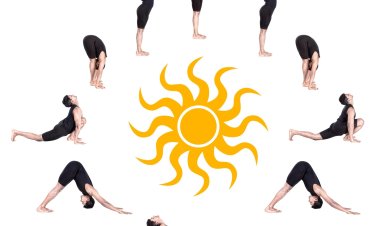Self Development
Self development is a process of transformation whereby a person adopts new ways of thinking to develop new behaviours and attitudes.
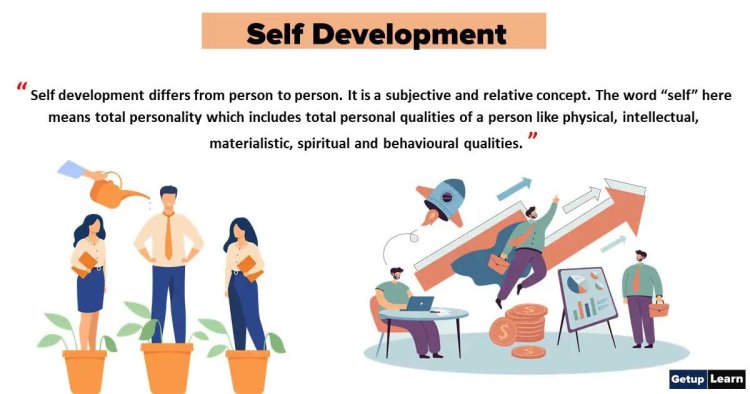
The practice of consciously bettering oneself in various facets of one's life is known as self-development. It is the deliberate pursuit of one's own development through the enhancement of knowledge, abilities, skills, and competencies. However, the most important aspect of self-development is the expansion of the individual self in order to actively pursue self-fulfillment.
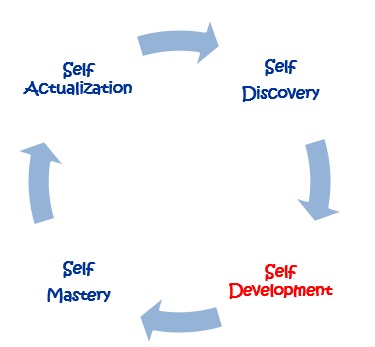
A lifelong process, self-development and personal growth allow you to evaluate your skills, create goals, and then take action to assist you reach your objectives and reach your full potential. Being fulfilled by oneself is the ultimate goal of self-development. That entails living intentionally, realizing your full potential, and achieving genuine happiness.
We divide self-development into three segments:
1. Skill Enhencement
2. Mental Conditioning
3. Hebit Creation
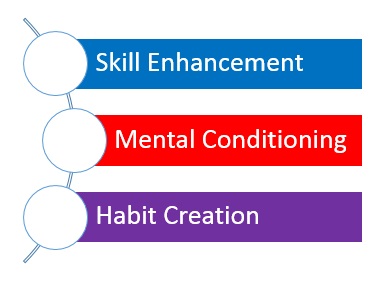
Skill Enhancement
The improvement of one's own competences, skills, and abilities is referred to as skill augmentation. It includes abilities for both interpersonal and individual effectiveness. The emphasis of interpersonal skills is on interactions and relationships with others. It covers interpersonal skills like leading people, teamwork, and communication. The core of one's own efficacy is their capacity for independent action. Goal-setting, problem-solving, time management, and stress management are some of the skills it covers.
Mental Conditioning
Building and bolstering our thoughts is the process of mental conditioning. Through imagery, visualization, and other methods, it enables us to keep a positive focus on our objectives. In order to improve our self-image, self-esteem, and self-confidence, it also enables us to develop good self-images and feelings. Techniques for mental conditioning include relaxation to ease stress and anxiety and enhance performance through increased concentration and focus.
Habit Creation
Building and bolstering our thoughts is the process of mental conditioning. Through imagery, visualization, and other methods, it enables us to keep a positive focus on our objectives. In order to improve our self-image, self-esteem, and self-confidence, it also enables us to develop good self-images and feelings. Techniques for mental conditioning include relaxation to ease stress and anxiety and enhance performance through increased concentration and focus.
The Process of Self Development
Prior to taking any practical actions in the development of skills, talents, or competences, the process of self-development starts. Self-awareness and self-discovery come first. To proceed from where you are, you must first determine where you are. You gain a deep awareness of your personality, values, proclivities, and beliefs through self-discovery. Additionally, it helps you discover your goals and the kind of person you want to be.
By evaluating your present skills, talents, and competencies, you start the actual steps in the improvement process after learning who you are and where you're headed.
The process of critically evaluating one's performance and abilities involves collecting information on one's own aptitude, skills, competencies, and capabilities. This is known as self-assessment. In contrast to self-awareness and self-discovery, self-assessment is simply the recognition of something or the knowledge that it exists. On the other hand, assessment refers to the process of estimating or quantifying something's quantity, worth, significance, scope, or pace.
You are better able to set and accomplish your goals after completing a self-assessment. Self-evaluation provides you with the knowledge required to construct a successful development plan. Making goals or benchmarks that assist define the course you want to take is a part of a development plan. You may concentrate your efforts on those talents and become more proficient at them if you are aware of the precise skills you need to improve or acquire. You compel yourself to arrange your resources and concentrate on learning new things, which makes you more efficient and well-organized. Your abilities and, eventually, performance, can both improve as you become more efficient.
As your performance improves, you accomplish more and gain more self-assurance. Having more self-assurance makes one happier and more fulfilled in life. Ultimately, you realize your entire potential and achieve self-actualization.
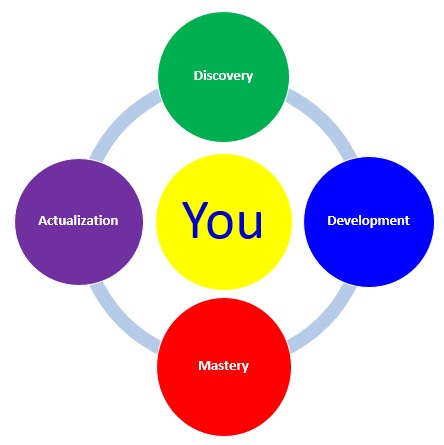
Elements of Self Development
Self - Concepts And Self Constructs
Self Concept
Self Identity
Self Image
Self Confidence
Buildin Self-Confidence
Self-Efficacy
Self-Esteem
Self Development vs. Self Improvement
Though they are frequently used synonymously, we prefer to distinguish between self-development and self-improvement (also known as self-help). In contrast to self-development, self-improvement typically refers to actions you take to enhance a problematic aspect of your life. In essence, it draws attention to or magnifies your flaws. Examples of self-improvement subjects include boosting self-esteem and organizing oneself. All of these are admirable ways to better oneself, but the emphasis is on a person's flaw, such as low self-esteem or disorganization, rather than a virtue or positive trait.
In contrast, self-development emphasizes personal development in all area of your life. It concentrates on both strong and weak points. It does not merely concentrate on its shortcomings. Self-development won't be the main focus, but it will address areas of weakness to make them easier. It actually focuses on enhancing your skills and pursuing your interests so that you can realize your full potential and experience personal fulfillment. If you are particularly talented in music or painting, for instance, self-development could help you hone that skill.
Activities that promote quality of life, develop abilities, create competencies, and eventually help people realize their hopes and objectives are considered self-development.
Top Books Recomended to Improve Self Development











